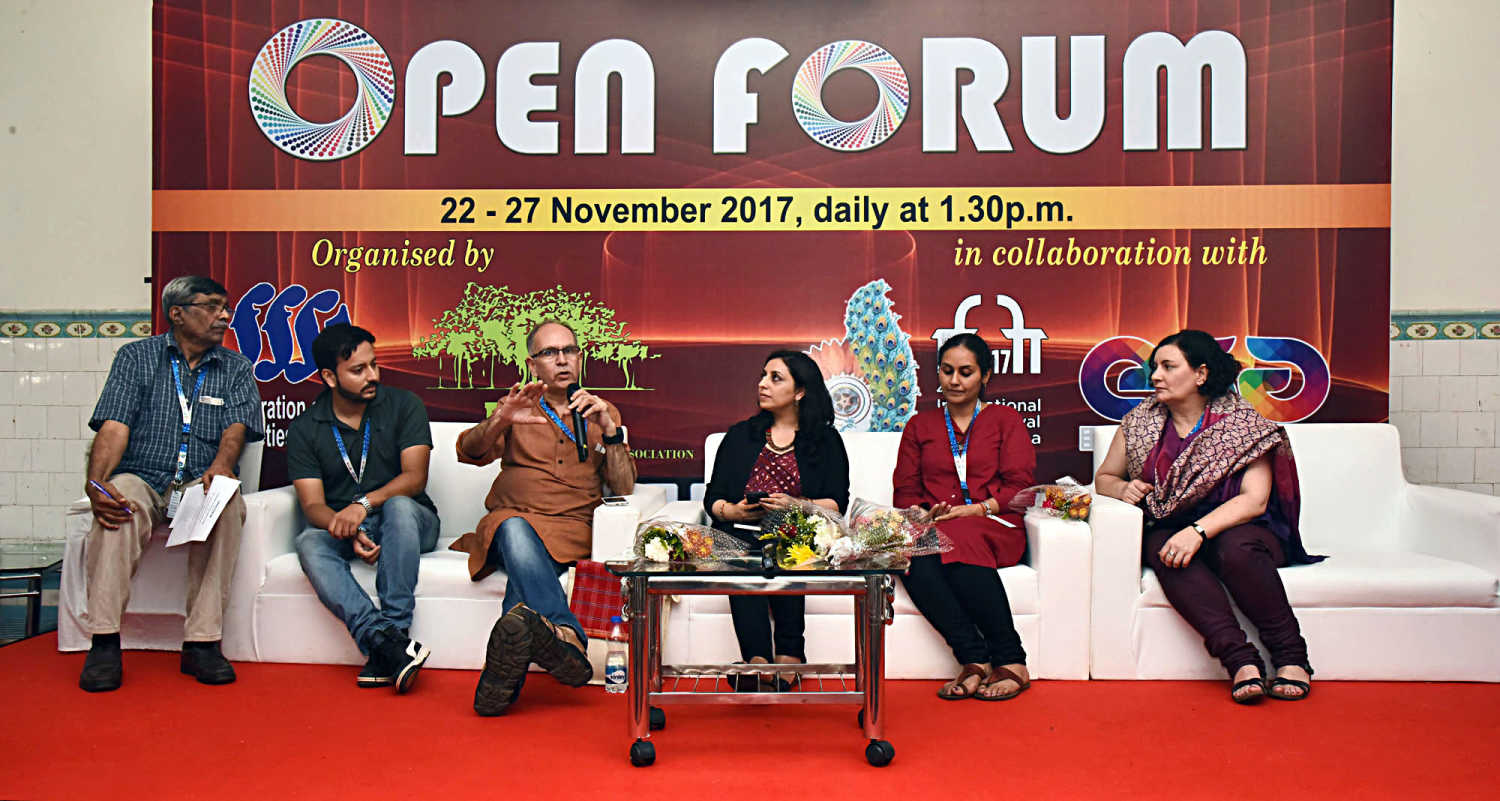At an open forum on the ‘Need for film courses and training to meet present-day demand’, panellists spoke about the perks of a formal education in filmmaking, though some believed some things about the craft cannot be taught.
IFFI 2017: Film school helps to create network, sustain career in filmmaking, agree panellists
Panaji - 25 Nov 2017 3:48 IST
Updated : 18:30 IST


Blessy Chettiar
The need for film courses and training is an integral part of a filmmaker's life, especially for those who would like to fine-tune their craft.
At Friday's Open Forum at the 48th International Film Festival of India (IFFI) in Panaji, on the ‘need for film courses and training to meet the present-day demand’, the panellists discussed how formal education in cinema could not only help churn out quality work, but also create an awareness of cinema history and the need for preservation.
Amit Tyagi, dean (film) at Pune's Film and Television Institute of India, Ana Tiwary, producer and director from Australia, Sukhpreet Kahlon, film scholar and head of research at Cinestaan.com, and Goan filmmaker Shashank Bhosale participated in the discussion.
Rattling off statistics, Tyagi said that in such a vast country with a huge population, a majority under the age of 30, there is an acute shortage of institutes teaching filmmaking. Many would come up in future, he predicted. “In this process of new film institutions and film training institutes starting up, there will be a lot which will not be so good," he cautioned.
"Given this scenario, we have to welcome all young people who are interested in becoming filmmakers or media practitioners in the audio-visual media," he continued. "I use the term ‘audio-visual’ carefully. It includes your traditional filmmaking, video games, VR etc.
"Filmmaking tools are more affordable these days. Point is, everybody is doing this. But does everyone go to a film school? No. Only 1% can afford to go to a private film school, like Whistling Woods International. Everybody else is ruled out straightaway.”
He added, “FTII takes 110 people every year. There is no way we can educate the population interested in filmmaking. We need to just train somebody in the asthetics of cinema. There are layers of training that come into play. Everybody doesn’t have to be a specialized film school personnel for the high end of the cinema industry. If somebody is looking to train boys and girls to only cover events or weddings, the training they require is very different. That is the reality of our situation today. We have to accept that reality, that there is a lot more diversity of training of the forms of mass media that have come about and hence require different training. This is what newer schools are catering to.”
Tiwary, who is a filmmaker and producer based in Australia, spoke about her time at film school in Shillong’s St Anthony’s college, which she treasured. “You can learn a lot on the job, but school helps speed up your learning," she said. "Film education is a lifelong learning journey.”
She added that her internship with the National Geographic channel while working towards her master's degree in film in the US helped her immensely.
Tiwary also mentioned that she enjoys going to film schools and reacquainting herself with the craft. She is in the process of putting together a syllabus on cultural competencies for a university in Australia.
As Tyagi spoke of the role of the internet in learning filmmaking, he outlined what you get at film that you don’t online. “Firstly, the learning is layered and structured. When you go to art school, you need to practise in many ways. Secondly, you have access to teachers who are experts in their fields,” he said.
Tiwary added a third point, saying, “Going to film school gives you a network of friends and future crew members. It creates a support system. This network is extremely helpful in creating and sustaining a career in filmmaking.”
Film scholar Kahlon, who is working on a doctorate in film studies at Delhi's Jawaharlal Nehru university, stressed the need to make young people aware of India’s rich cinematic history. “While we are talking about the importance of filmmaking courses that facilitate a future generation of directors, actors, technicians, editors, etc, we also need to talk about film history, appreciation and preservation," she said, recalling how Kiran Shantaram, who opened the forum, spoke of wanting to bring cinema to more and more audiences, and create a cinema culture.
Samantha Sartori, a journalist from New York, had a different point of view. She said, “This profession needs heart. A director can learn from anywhere, but a DoP [director of photography] absolutely needs formal education. I feel there is a place between film school and no film school. I will be more flexible. I feel there is something in filmmaking that cannot be taught. You can improve a lot, you need to push them.”
It was refreshing to hear documentary filmmaker Bhosale, who said he learnt filmmaking through his love for photography. Speaking about his film on saving the mangroves on Goa's Chorao island, he said, “I didn’t go to film school. The whole documentary I shot was through my experience with photography. I never knew about documentation, how to go and shoot. I learnt it while doing it.”
Asked if he would be open to join a film school at this stage of his career to fine-tune his craft, Bhosale said, “I would still love to do the on-the-job training which I have been doing. I would like to attend small workshops that keep happening in Goa. During some I attended, a lot of things were covered which I was missing out on. The training workshops that the Entertainment Society of Goa has been conducting are an add-on. I hope more are conducted for film lovers in Goa.”
Related topics
IFFI

